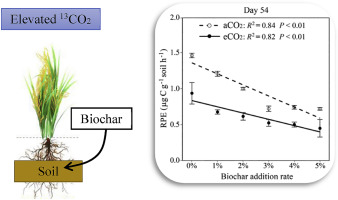Soil Biology and Biochemistry ( IF 9.8 ) Pub Date : 2019-12-26 , DOI: 10.1016/j.soilbio.2019.107700 Junmin Pei , Feike A. Dijkstra , Jinquan Li , Changming Fang , Jinghua Su , Jiayuan Zhao , Ming Nie , Jihua Wu

|
Biochar can store carbon in soils for decades to centuries, and is considered to have some potential to contribute to mitigating climate change. However, both biochar and elevated atmospheric CO2 (eCO2) can influence the rhizosphere priming effect (RPE) on pre-existing soil organic carbon (SOC) decomposition, leading to uncertainty in comprehensively evaluating the soil carbon sequestration potential of biochar under future climate change. In the present study, we investigated the RPE on pre-existing SOC decomposition of paddy rice in a soil-plant-biochar system under eCO2 (700 ppm). Plant-derived sources of carbon were separated from soil-derived sources using a continuous 13C-labelling method. We found that the RPEs decreased significantly with increasing biochar addition rates (1%, 2%, 3%, 4%, and 5% by weight) with mean reductions of 12% and 40% on day 31 and 54 after sowing, respectively, suggesting that biochar can enhance the stability of pre-existing SOC by decreasing the RPE. Although compared to ambient CO2 (aCO2, 400 ppm), eCO2 significantly decreased RPEs by 33% and 37% on day 31 and 54 after sowing, respectively, the decline in the RPE in response to biochar was weaker under eCO2. Decreases in soil enzyme activities and microbial biomass carbon could explain the decline in the RPE in response to biochar addition. Our findings highlight that biochar can inhibit the decomposition of pre-existing SOC by reducing the RPE, while this effect will be weakened in the face of atmospheric CO2 increase in the future.
中文翻译:

在升高的CO 2下,生物炭引起的根际启动作用的降低作用较弱
生物炭可以在土壤中储存碳数十年至数百年,被认为具有一定的潜力来缓解气候变化。然而,生物炭和升高的大气CO 2(eCO 2)均可影响根际对土壤有机碳(SOC)分解的引发作用(RPE),从而导致在未来气候下全面评估生物炭的固碳潜力的不确定性改变。在本研究中,我们研究了在eCO 2(700 ppm)下土壤-植物-生物炭系统中稻米预先存在的SOC分解的RPE 。使用连续的13种方法将植物来源的碳源与土壤来源的碳源分离C标签方法。我们发现,随着生物炭添加量(按重量计分别为1%,2%,3%,4%和5%)的增加,RPE显着下降,播种后第31天和第54天的平均下降分别为12%和40%,这表明生物炭可以通过降低RPE来增强现有SOC的稳定性。虽然相对于环境CO 2(ACO 2,400ppm的),ECO 2显著了33%和播种后的第3154天和37%降低的RPE,分别响应于生物炭在RPE中的下降ECO下较弱2。土壤酶活性和微生物生物量碳的下降可能解释了由于添加生物炭而引起的RPE下降。我们的发现突出表明,生物炭可以通过降低RPE来抑制先前存在的SOC的分解,而在将来面对大气CO 2增加时,这种作用将减弱。











































 京公网安备 11010802027423号
京公网安备 11010802027423号